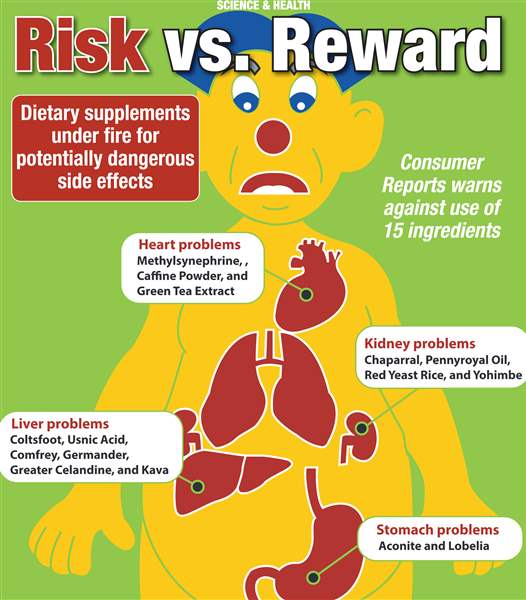
SCIENCE & HEALTH
Dietary supplements: Risk vs. Reward
Supplements under fire for potentially dangerous side effects
8/8/2016
Many people turn to dietary supplements to stay healthy and fit, because they can be purchased without a prescription and are often thought to be more natural than prescribed drugs.
A recent report, however, is questioning the safety of ingredients commonly found in them and warns that some supplements can actually be harmful to users.
Consumer Reports magazine recently called into question the widespread use of 15 ingredients used in some supplements. Whether powders, liquids, or pills, dietary supplements do not have to adhere to the same regulatory standards as prescription or even over-the-counter drugs, the report said.
Widely available online or in stores, the health risks associated with supplements can lead to problems ranging from nausea to organ damage and cancer, Consumer Reports asserts.
The magazine says it used a six-person panel of physicians and dietary supplement experts who reviewed medical studies, government warnings, and other literature to develop the list of 15 ingredients which pose a serious health risk.
VIEW: Supplemental Risk chart
The ingredients studied include Chaparral for weight loss; Comfrey to combat heavy menstrual periods; Kava for insomnia, and Red Yeast Rice (also called: Monascus purpureus) to lower bad cholesterol and prevent heart disease.
Dr. Ryan Szepiela, a Toledo sports medicine physician, agreed that many dietary supplements can cause harm if taken in the wrong dose or if they interact with other drugs already in a person’s system. The ProMedica physician, however, stopped short of suggesting that people should avoid every ingredient labeled harmful by Consumer Reports.
“I think [supplements] have a higher risk just like certain medicines have a higher risk,” Dr. Szepiela said.
Not all supplements are bad, but what is most important is being educated about what is going into your body and how these ingredients could potentially interact with other medications you are already taking, he said.
Since there is no testing performed on supplements before they are put in stores and marketed to consumers, it’s difficult to know all the side effects associated with them, he said.
Of the 15 ingredients cited by Consumer Reports, the magazine said unwanted side effects “usually occur in people who are already sick or who have some chronic problem like diabetes,” Dr. Szepiela said.
Theresa Tate, a registered dietitian for metabolic and bariatric patients at Mercy Health, said she did not recognize any of the ingredients listed by Consumer Reports.
“I don’t see a lot of people using these,” she said. It does not mean, however, that they are not used and that people around the country are not exposed to them, she added.
“What we see here is people come in and they are taking a lot of supplements. I don’t try to talk people out of taking supplements, but I tell them they are taking a pill everyday and they don’t have science to back it up,” Ms Tate said.
Both medical professionals stressed that prescription and over the counter medications are highly regulated by the federal government. They must go through rigorous testing and clinical trials before they are released to the public by the U.S. Food and Drug Administration.
Supplements, however, are not tested by the FDA before they are sold, Ms. Tate said.
“I think the supplement industry has done a good job of selling to people,” she said. “Take this and this is going to cure everything. It’s so easy but it doesn’t work all the time and it's not safe.”
The magazine panel said unanticipated side effects from some supplements can include liver damage, kidney and muscle problems, rapid heart rate, hypothermia, vomiting, and diarrhea.
Many consumers are misled by the use of the term “natural” in advertising for supplements, Dr. Szepiela said. “People hear the word natural and they think ‘Oh that’s safe; it comes from a natural plant or a natural substance,’ ”
This not always true, he said.
“You are trusting somebody who is trying to make money off of a product and it’s totally unregulated,” Ms. Tate said.
The most popular dietary supplements have always been those that promise to help people lose weight, increase sex drive, or enhance athletic performance, said Dr. Szepiela, who is also the team physician for the Mud Hens.
Instead of wasting money on unproven supplements, Ms. Tate suggested that those who are trying to get healthy should first try methods that are proven by science to work.
Getting eight hours of sleep each night, getting a proper amount of exercise, and learning techniques to relax and relieve stress are some of the best methods available to better your health, she said.
Contact Marlene Harris-Taylor at: mtaylor@theblade.com, 419-724-6091, or on Twitter @marlenetaylor48.